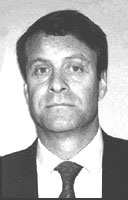
|
MASTER OF THE GAME� By Guy Gugliotta "Permissions provided by The Miami Herald. �" |

|
There have been literally many volumes written about the turbulent experiences of participants in the war in South East Asia and the
effect such experiences had on those participants later in in their lives. The predominant and "politically correct" view seems to be
that the memories of these events produced long lasting trauma that was detrimental to the well being of the individuals involved.
But like the "greatest generation" of World War II and the veterans of Korea, the vast majority of Vietnam era
veterans returned to satisfying and productive lives that were in some ways enhanced when their "hearts were touched
by fire"
Guy Gugliotta, a staff writer at The Miami Herald newspaper at the time, expressed this latter sentiment very
eloquently in this feature piece he wrote for that paper in late 1989. And by the way, the article also
presents a very accurate word picture of what life on a Swift Boat was really like operating on the rivers and
coasts of Vietnam during the final year of direct US Navy involvement on the boats.
|
It has been 20 years since I went to the Mekong Delta as the commanding officer of a small patrol boat. Serving in Vietnam was undoubtedly the most important experience of my life. Like many men of my generation, I am who I am today largely as a result of Vietnam. From the moment I returned to the United States in late 1970, I could tell that my family, friends and acquaintances sensed the change. I knew they wanted to know about the war, but were afraid to ask. People thought,and continue to think even today, that Vietnam is too delicate a subject to discuss over drinks. Maybe they wondered if I had flashbacks, or if I ever felt like picking up a rifle and murdering someone. I didn't. Nor did I ever feel mental anguish, combat fatigue, guilt or anything like that. |
As a result, I have never had a meaningful conversation about Vietnam with my parents, my wife, or even myself. For years I brooded;
I told myself repeatedly that I needed to get to the bottom of the experience, and that I owed it to myself to come to grips with it.
But I never did.
Now it seems easier. The memories are musty, less real. And the ones that remain vivid are somehow less threatening. I have reached
the age where I can no longer surprise myself. Things that once seemed painfully embarrassing or bloodchilling seem less so with
hindsight. They seem, finally, like the sort of things a 23-year-old kid might do. The sort of things that might change a 23-year-old
kid into someone else.
But that's not the whole story. There was something else lurking in those unexamined memories of one year in my life; the uncomfortable
thing that was always out there, just out of reach, crouching in the jungle, swimming under the black water, covered by a dirty tarp in
a villager's fishing boat. It was the thing that made Vietnam hard to talk about, hard to put behind me. It was the truth.
|
In Vietnam I learned how to fish with hand grenades, slay rats with a mongoose, win hearts and minds with Tina Turner and wear a boa
constrictor for a necktie. I could turn a 50-foot 6-inch patrol boat end-for-end traveling at 30 knots in a muddy canal no more than
70 feet wide. I could rig Claymore mines, heat meals with C-4 explosive, and load, fire and maintain more than 30 different weapons.
My quartermaster was a biker, my boatswain was a gun nut, my engineman was a bigamist and my mortarman was a drunk. I recommended most
of them for re-enlistment.
"They're good at what they do," I told my division commander. "And if you don't let them stay in the Navy they'll all be dead or
in jail within a year." | 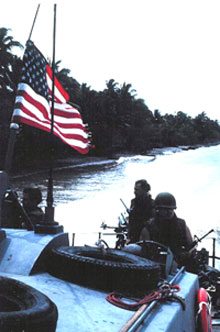 |
I was there for calendar year 1970, a Navy reserve lieutenant (junior grade) and former English major with no physical defects, no
marketable skills, no wife and kids, no influential politician friends and no moral convictions strong enough to induce me to spend
three or four years in jail or in Canada. When I graduated from college in 1967, my possibilities of escaping military service were nil.
So I joined the Navy.
I spent two years as a watch officer aboard a Newport, R.I.-based destroyer, doing well even though I had no real aptitude. I lost my
smart mouth, acquired a measure of self-discipline and eventually even wore the uniform well enough to pass inspection.
|
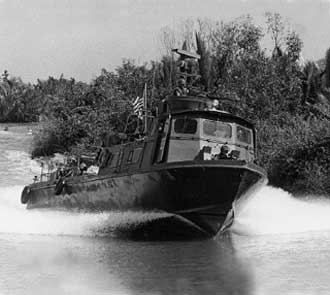 |
It thus came as quite a surprise to my friends and parents when I volunteered for Vietnam, giving up an easy life of Mediterranean and Caribbean cruises in favor of an uncertain future as a swamp guerrilla in the Mekong Delta, or more specifically, officer-in-charge of a U.S. Navy Patrol Craft Fast, or PCF, popularly known as a Swift Boat. PCF's had a crew of six and were one size bigger than the boats in the movie Apocalypse Now. Martin Sheen and I did the same weird things for a living. I did not volunteer because I hated communism. I had never thought about communism in my life. The extent of my ideology was that I hated taking orders. On my own boat, I would give the orders. |
That's what I said when people asked me why I went. There was more to it. Ever since I had graduated from high school, Vietnam had
dominated my life. My friends and I had arranged our whole lives around the question of what to do about it. By the time I joined the
Navy, everyone I knew was either in Vietnam or on the run from Vietnam, and I was sitting in Newport watching sailboats. I had escaped,
but I felt strangely cheated. If I didn't go to Vietnam, I would always wonder what I had missed. Vietnam was unusual and dangerous,
like space travel, and if they ever started selling tickets to the moon, I knew I'd be in line. I went to Vietnam to see what it was
like.
I wanted to be like my father, a career Naval officer and a World War II veteran, or like the heroes of cowboy movies and comic books:
I wouldn't ask for trouble, but if trouble came, I would be ready. Vietnam fit my childhood self-image, and in many ways I was still
a child. I expected to go to Vietnam, fight, and come home, perhaps fulfilled in some mysterious way, but still basically the same
happy-go-lucky fool I had always been.
|
I arrived in Vietnam in the first week of 1970 and went to U.S. Navy Coastal Division 11, working in the Ca Mau Peninsula, the extreme southern end of both the Mekong Delta and South Vietnam. It was little more than a gigantic stretch of swampland and tropical forest crisscrossed by hundreds of muddy rivers and canals. The Viet Cong had dominated the area for several years, but Swift Boats had begun raiding the rivers in 1969, and by the end of the year the Navy had set up a semi-permanent base on pontoons moored in the Cua Lon River. The base was known as Sea Float | 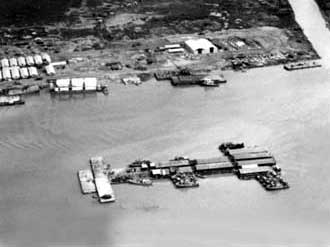 |
By the time I arrived, these were the rules of the game: The U.S. government put all the local peasants it could find into a couple of South Vietnamese army-controlled hamlets where they wouldn't be harmed (by those of us who were shooting up the area) and where they couldn't do any harm (like spying for the bad guys). |
 |
U.S. aircraft had also used Agent Orange to defoliate 150 meters of jungle on either side of the Cua Lon and other main rivers, forcing
the enemy to move deeper into the trees. It was hard for an enemy rocket team to set up a firebase in woods that looked like South Jersey
bottomland in December.
All this was good for our side, but the enemy had advantages of its own. Charlie may have conceded us the highways, but
the side streets and alleys belonged to him.
|
|
Viet Cong sentries sat in static ambush with pods of battery-fired B-40 "Chicom" rockets mounted beneath the low fronds of nipa palms clustered at the edge of undefoliated river banks. Everybody's first firefight began with a puff of smoke and a swirling fan of these lethal Roman candles. Most spun harmlessly into the river, but there was enough shrapnel in one mango-sized warhead to kill or wound everyone on your boat. And things didn't improve beyond the B-40s, for initial success simply got you past the sentries - teen-age Viet Cong recruits, for the most part - and put you into what we called the "secret zone." |
In the "secret zone" - about seven-eighths of the territory around Sea Float - the enemy was not only the V.C., but also North Vietnamese army commandos, known simply as "NVA." They were small and skinny and wore loose-fitting black pajamas. They looked ridiculous, but I never heard anybody laugh about them, and nobody ever called them gooks. They carried assault rifles and bazookas. They hit what they aimed at, and they only took good shots. We gave them nothing but respect. |  |
My first firefight was a textbook example of how our war was fought. Mine was the lead boat in a two-boat patrol assigned
to "probe" a small canal in the secret zone. We crept in at 3 knots, hoping to muffle our approach long enough so we could
spot trouble before it happened to us.
About 10 minutes into the canal Charlie fired a set of B-40s from an all-but-invisible rocket mount set up on the river bank. One never went off, two others swooped aimlessly into the trees and the fourth spun into the water and exploded.
We were lucky. Then we tripped a shore-mounted Claymore mine - nuts, bolts and scraps of steel encased in paraffin and stuck
to a shaped-charge of high explosive. A Claymore explodes like a cannon-sized shotgun blast, sending a short-range but lethal
curtain of shrapnel sweeping along a boat's deck, wounding everybody in sight.
|
Except we were moving so slowly that the Claymore damaged nothing, simply punching a hole in the boat just forward of the
doorway where I sat with an M-16 rifle. The helmsman gunned the engines and we sped through the attack, pouring rounds into
the woods in hopes of forcing the rocket team to back off long enough for us to escape.
Instead, we ran right into a wall of automatic rifle fire. We were under attack from both banks. It had gone from dead silence to shattering chaos in an instant. |
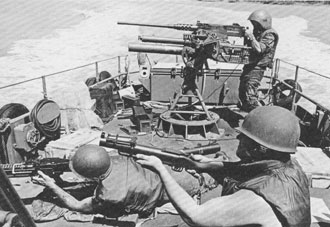 |
I was checking to make sure I hadn't been hit by shrapnel and trying to think of something intelligent to do, when an NVA
rocketman suddenly stood up on the river bank with a B-40 launcher pointed at my lap. My tail gunner cut him down with a
burst from his machine gun.
And that was all. The entire event took perhaps 30 seconds. Both sides had depended on surprise, and we were the ones who
got caught. But we were luckier and had reacted quicker, getting out of trouble before we got badly hit. One of theirs was
dead, and we had a pluggable hole in the bow.
|
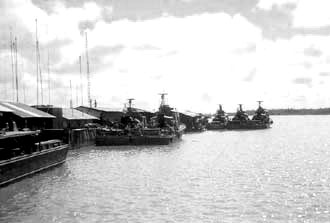 |
About 10 Swift Boats were stationed at
Sea Float at any one time.
Each was equipped with an arsenal of weapons and two 12-cylinder GMC diesels that could produce 30 knots at full bore, and we
ran at full bore almost all the time.
So it wasn't so bad. We were young, we were making a lot of noise and we were packing enough firepower to tear down trees. Lords of
the jungle: I grew a beard, chewed tobacco and acquired a Tommy gun for a personal weapon.
|
|
The object of our game was to win the hearts and minds of the local people by killing all the "Viet Cong and North Vietnamese Communist aggressors" we could find. This was all right, except there weren't a whole lot of hearts and minds still lying around loose. Most of ours were gathered in woodcutter hamlets along the Cua Lon, and most of theirs, one presumed, were organized in workers' Soviets deep in the secret zone. |
The whole set-up reminded me of a huge board game, and the Navy did as much as possible to foster the illusion. The Navy provided food, ammo, clothing, Coca-Cola, diesel fuel and moral support, divided all the territory up into numbered grid squares on a chart, and gave us the opportunities we needed to study and ply the trade. In a couple of months I became an expert, and in guerrilla war, an expert is almost impossible to kill. We never lost more than four men in a single engagement, and neither did Charlie. |
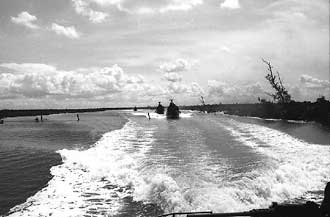
|
We sought stalemate at progressively higher levels of expertise. I felt it was a noble calling, and something in which I could take a certain measure of pride. I never thought about winning. I was content to survive and to continue playing. Charlie and the Swift Boats were like two youth gangs in a vacant lot. If it moved, zap it. There were no unaffiliated civilians to kill by mistake. We didn't have hordes of soldiers dying in insane pitched battles; we weren't dropping thousand-pound bombs on anybody; and we weren't promoting nuclear holocaust. Ours was a clean and close fight - one-on-one, face-to-face in the wilderness. Thus it was that we had little enthusiasm for periodic "Psyops" (Psychological Operations) designed to further our cause with the Vietnamese. It tended to muddle things up, dilute the action with the impurity of a political campaign. Besides, in our area the only Vietnamese we knew about were waiting to tear our heads off; there wasn't any point in preaching to them. My crew pointed this out to me the first time we were instructed to cruise the canals playing tapes of " The Wandering Soul ," a howling banshee sermon promising eternal damnation to any Viet Cong who didn't lay down his weapons and join up with us right away. Nobody on the boat understood the words, but any boat that played it usually got hit with rockets. " The Wandering Soul," as Seaman Sherwood J. Drumheller told me, "is Number 10." And dropping off the chart. |
 |
Unfortunately, I pointed out, we were the only boat on duty that had a functional "Psyops System" - to wit, a loudspeaker.
"We're going to have to play something," I said.
"Great," said Drumheller, who was 19 and the only normal person on the boat besides me. He favored Steppenwolf, Credence or the Stones,
but would also go with Santana because "some of the words are foreign."
|
Boatswain's mate Hogan, who was from Lubbock, collected machine pistols as a hobby and had no known first name, hated Steppenwolf, but
offered Buck Owens or Dolly Parton in exchange.
"Not heavy enough," I concluded. I chose Ike and Tina Turner (Workin' Together), pointing out that Tina, like Dolly, was a girl, and she
sang Honky Tonk Woman (Stones) and Proud Mary (Credence), which, incidentally, was about a river boat. Besides, she had a voice that could
melt steel; Charlie would love it.
And it worked. For six hours in the middle of the night Tina Turner ripped through the forest like a chain saw, and we didn't hear a
single gunshot or see a single muzzle-flash. "The Wandering Soul" was never heard again on the Cua Lon River.
|
 |
I knew, of course, that our adventures with Tina would never create a good impression in what we fondly remembered as the "real world."
In the real world things were complicated. Hawks would think I was cheating America's anti-Communist public out of its tax dollar. Doves
would accuse me of trivializing a desperately serious human tragedy.
Things like this were impossible to explain to civilians, and made us look like dangerous psychopaths (Robert Duvall in quest of the
Perfect Wave in Apocalypse Now).
|
Here's the United States locked in the most divisive struggle in its history, and the front-line
soldiers are playing Tina Turner concerts for the enemy.
Or having barbecues with plastic explosive. It was a Special Forces captain who showed us that a block of C-4 burned like Sterno if you
lit it with a match, perfect for warming C-rations. In turn, we demonstrated how the shock from a concussion grenade dropped into a
shallow canal will kill an eight-pound grouper and send it floating to the surface. One of these could feed a whole boat for two days.
Nothing like river grouper grilled over C-4.
But what were we supposed to do? Sit around and agonize over the moral dilemma posed by Vietnam? It did us no good. As we cruised down
the river with the .50s on full cock, we knew it didn't matter whether we were for or against the war. We were in the war.
It was clear we weren't winning. We had to fight as hard as we knew how just to hold onto our small stretch of river. No one ever talked
about doing anything more than staying even. And soon it became clear that President Nixon had decided it was too expensive to do that.
So we were abandoning a losing cause gradually - turning the fighting over to the South Vietnamese.
Still, it wasn't like we were cynical, bitter and depressed. Quite the opposite. We spent hours planning elaborate raids and discussing
tactics. When Charlie ambushed us, should we keep going, or should we drive the boat right into the river bank and hope to trap them
before they got away? Should we travel full bore and run through the ambush before they hit us, or should we travel at 3 knots on one
engine and hope we could sneak by?
We took pride in our work: Another boat officer and I gained fame one day when two SEAL teams deep in the forest called, for help,
claiming they were "pinned down by a battalion-sized unit of NVA regulars.'' I hadn't seen a battalion-sized anything since I arrived
on the Cua Lon (how would you feed them?), but there was no denying the hysteria in the radioman's voice. We gunned our engines and
charged into a tiny canal, spraying chocolate water all over each other.
|
When we spotted a red signal flare, we turned our helms hard aport and rammed the left bank, driving the bows high and deep into the mud.
Our momentum threw the sterns around, and suddenly the boats had flipped 180 degrees and were pointing back downstream toward safety.
Wow! The SEALS, who had retreated to the riverbank, piled aboard and we were gone, shooting hell out of the jungle all the way home.
We never saw a single enemy soldier. | 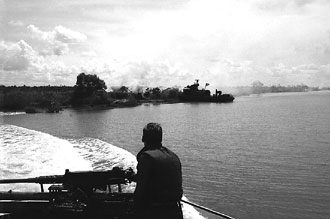 |
All of us - officers and crews - were arrogant wisecrackers on one level, but we were very serious about what we were doing. If we
screwed up, we were dead, and there was no way I or my men were going to die because someone's gun jammed. The fear made us careful,
and gave me an infinite capacity to take pains. I wore 40 pounds of body armor when I went on patrol, and I was no fatalist. Any bullet
that had "my name on it" was going to have to punch its way through an inch of Kevlar.
It wasn't that I hid in corners or shivered in blind panic, but fear became a familiar friend, a faint uneasiness that I trusted and
needed. I was able to concentrate on what I needed to survive and to discard everything else. I could see and hear better than at any
time in my life, and I was able to endure serious physical hardship and discomfort without even remarking on it. I could rest for hours
without sleeping on the hard deck of my boat, forcing my body to relax while one compartment of my brain listened to the jungle. I could
survive on one C-ration meal a day. I could see the glare from a lit cigarette at 100 yards.
Vietnam was leeching the sloth from my 23-year-old mind. I took nothing for granted and trusted no one. If my crew told me the guns were
clean, I had to see for myself; if they said the engines were running properly, I had to listen; if they told me the radio had a new
battery, I had to test it.
|
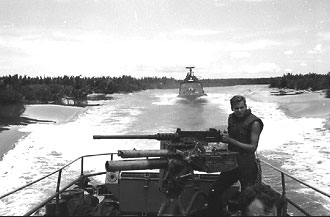 |
Before every patrol I memorized the identities and call signs of every friendly unit in the area, and memorized the radio signals I would
make if we were attacked.
After a while I found I had powers of concentration that could routinely handle mental chores that would have made the English major I
once was sob in frustration. I came to feel that I could solve any problem if I simply brought the entire force of my will to bear on it.
|
Our lives became primitive, simple and savage. Nobody wore underwear - fungus thrived in it - and most of us grew beards and mustaches.
We slept on plastic mats with mosquito netting draped over our heads. We cooled off by jumping in the brackish water, and would chase
around the river for an hour looking for a tropical rainstorm to wash in.
We drank a lot, got into fights and listened to rock music. We laughed raucously and swore horribly. We were truly unfit for polite
society, as loud and unruly as buccaneers on the Spanish Main.
Most of the Swift Boat officers and a significant number of the younger crewmen spent a large amount of time thinking about how long they had left "in country" (expressed as so many days "and a wake-up"), and how long left in the Navy. These two phenomena, as Sherwood J. Drumheller said, should not be considered separately: "The word of the day is better" he decided one day, smarting from a particularly unpleasant encounter with the executive officer who insisted that he wear underwear and tie his shoes.
|
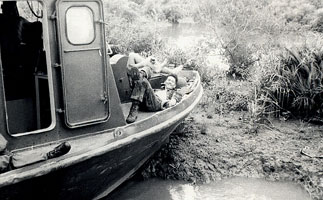 | Swift Boats offered crew members two things they never had before in the Navy: a home and privacy. Most of them had spent their previous years aboard crowded ships, sleeping three-deep in tiered bunks with 25 to 30 of their fellows. In Vietnam, there were only six men to a boat and unlimited space to stow gear, strew things around and make messes. You ate when you wanted, slept when you wanted, and the only officer around was me. |
|
And on a Swift Boat it was easy to have a pet like Bruce the mongoose, a super-sociable little creature won by Hogan in a card game
Bruce was small and skinny, maybe six inches long with a tail the same length. He sat on Hogan's shoulder during patrol. We found out Bruce had marketable talents the day another crew stopped their boat alongside us and announced they had a rat aboard. They couldn't find him, trap him or figure out any other way to get rid of him. Before the conversation could proceed any further, however, Bruce leaped from Hogan's shoulder to the other boat and stood quivering, his nose moving from right to left. Shortly we heard a thump and skitter from deep inside. Bruce ran for the main cabin, where he found the rat, about twice as long as he was and twice as heavy. Bruce gave two head fakes and the rat broke for freedom, but Bruce ducked low, dug his teeth into the underside of the rat's jaw and used the rat's own momentum to flip it over and break its neck. The whole episode took perhaps 30 seconds. Everybody applauded. Bruce became famous, and brought great glory to the boat. Hogan charged $10 for the service and guaranteed success in under 10 minutes. Outsiders from other boats could watch the show for $1 apiece, and Bruce never disappointed. He was quick and merciless, as efficient a killing machine as anything in the river. Bruce was a division hero. On April 30 the United States invaded Cambodia, causing a surge of expectation among the brass in Saigon and fresh rage by protesters at home. For us it seemed an abstraction at first, not real. U.S. forces could invade Cambodia, I thought, but they weren't going to do us any good. We'd still be chasing guerrillas in the jungle; we'd just be doing it in a bigger jungle. My mother sent me a letter saying she had finally become so enraged that she had sent Nixon a protest note. I wrote back saying it wasn't so bad - one of dozens of letters I wrote to various people that year that said it wasn't so bad. |
Then Newsweek arrived with reports of the deaths of four student protesters at Kent State University, an event so unbelievably
stupid it almost made me sick. No wonder the American public thought we were baby killers. We had a bunch of incompetent National
Guard draft dodgers handling our public relations.
Front-line soldiers hate everybody who sneaks out of having to serve, and we hated the National Guard worst of all.
| 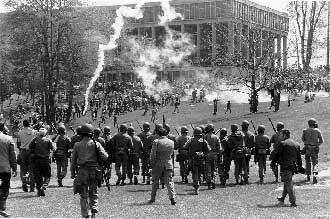 |
The National Guard was the perfect tool for the rich and powerful to evade the draft without going to jail or into exile: A person could be a patriot without ever having to prove it. In 1988 George Bush would irrevocably lose my vote when he named a former Guardsman to be his running mate. Despite my disgust, Kent State marked the moment when I first perceived that I no longer reacted to events in the same way as my parents and friends at home. For my mother - and almost everyone else in the United States, it seemed - Kent State was a moral apocalypse calling forth a collective bellow of anguish. I couldn't respond to the metaphysics. For me Kent State was a little-league technical problem that a squad of Marines could have solved with squirt guns. Nobody needed to die. I was furious at the National Guard for putting a stink on the uniform and especially for scaring my mother, but Kent State had nothing to do with me. It might as well have happened on Mars. At that point the United States began to feel like a foreign country. After Cambodia things got uglier for us. The squadron sent several boats - including mine - to the mouth of the Giang Thanh River at the Vietnamese border town of Ha Tien |
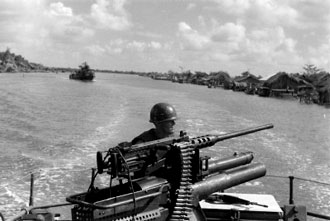 | Suddenly there were people, thousands of them, walking the paths along the river between villages of fragile huts built on stilts in the water. A few miles into Cambodia there were big doings. We heard the report of heavy artillery, watched the squadrons of Phantom jets scream out of the sky, diving almost to tree level before they lobbed out 500-pound bombs and shot back into the clouds. We saw the ragged refugees and heard the rumors of pitched battles involving thousands of soldiers. |
None of it made any sense to me. We had never before seen big-time war. At Sea Float our war was personal, discrete, surgical. Even here the enemy was scattered in small groups in vast jungles, all mixed in with friendly civilians. The indiscriminate force of the firepower we were witnessing horrified us. It was as if our side had gotten tired of picking ticks off the dog and had decided to douse it in gasoline and set it on fire instead. |
Our job was to search water taxis and cargo sampans for North Vietnamese infiltrators, which didn't seem to make much sense. None of us spoke more than a few words of Vietnamese. But we were expected to stop everything that came down the river, hundreds of boats a day, and check everybody's ID. Without upsetting anyone. We inspected one boat in four, checked IDs, told jokes and smiled a lot. We never found an infiltrator. | 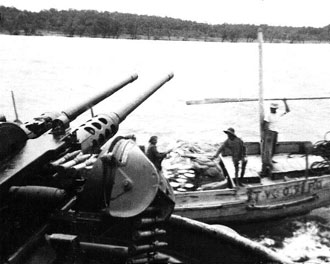 |
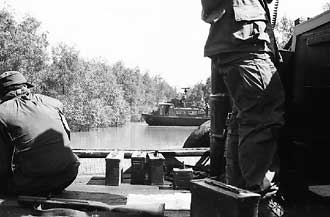 | So we played traffic cop by day. At night we set riverside ambushes. Nighttime could be utterly terrifying. This was not because there were big NVA units coming across the river, but because the South Vietnamese and Cambodians used the darkness as a cover to mortar the other's river side towns. The Vietnamese and Cambodians hated each other, and the fireworks that attended our Cambodian invasion were a perfect opportunity for them to get it on. |
We simply hunkered down and waited for daylight, then cruised the river surveying the burning cottages and caved-in boats. By midmorning rafts full of Vietnamese refugees were streaming down the Giang Thanh after fleeing Cambodia. What we had was a horrible mess, a reasonably peaceful backwater suddenly transformed into a fairly high-profile killing ground. All we could do was tow rafts to Ha Tien, find medical help for the injured and put out fires. |
And then the North Vietnamese figured out how to take advantage of this debacle. For 10 days a rocket team worked the river banks, hitting a boat every day, ultimately wounding several sailors and killing two or three. Two of our boats finally trapped the enemy rocket team in broad daylight and killed four of the commandos. Then one of our crews tied the dead triggerman to a boarding net hanging from the bow. The boat roared down the river at full speed, the body displayed like a dead deer on the hood of a pickup truck. | 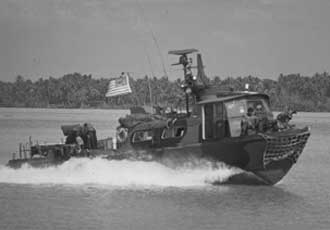 |
The crew dumped the corpse in the middle of Ha Tien's outdoor market shortly after 2 p.m. The NVA rocketman in death had probably served his country as well as he had in life, for he had induced us to disgrace ourselves and insult the people we were trying to help. This was an episode from Lt. Calley's horror movie. How would you feel 10 years from now, I asked myself, if you had been the one who once dumped a corpse in the middle of someone's shopping day? My crew, exultant like most of the others, watched and cheered our victory. I felt elated, too, but I didn't cheer. My girlfriend complained about the Cambodian invasion in a letter and asked why I didn't write more often and more sympathetically. I couldn't think of what to say. My politics had not matured: I still had no feelings one way or the other about the war and remained boorishly uninvolved in the debate. I wrote my girlfriend telling her I was all right, don't bother me. She didn't, but when I got home she was gone. This happened to huge numbers of us, officers and crew, but most of us never really felt the impact on our personal lives until later. What went on at home didn't seem to matter. If it didn't have something to do with drinking, fighting or raising hell, I had trouble visualizing it. We left Ha Tien and returned to Sea Float, where things remained much as before. One night NVA swimmers sank a South Vietnamese hospital ship with a water mine. We picked up about 30 people, including patients, staff and family. Drumheller brought at least two drowning victims back to life with mouth-to-mouth, and the engineman personally fished a half-dozen survivors from the wreckage. The next day another swimmer tried to mine Sea Float itself, but a sentry spotted him in the water, grabbed him by the hair and blew his brains out. A few days after that a third mine nearly sank a repair ship anchored nearby, and a few hours earlier a machinist from the same ship had come aboard our boat to repair our refrigerator and had killed Bruce the mongoose with a hammer, mistaking him for a rat. The engineman interceded just in time to prevent Hogan from murdering the machinist with a black-market 9mm Swedish "K" automatic pistol. |
One afternoon on the Dam Doi River an NVA rocket team blew a
five-foot hole in our boat
with a "launch bomb," a football-sized metal shell filled with several pounds of high explosive. I beached the boat in the
middle of the ambush and called for help. We were totaled.
We stripped off all the guns and equipment, put them aboard a riverine landing craft and accepted the offer to take us home without
our primary ride. | 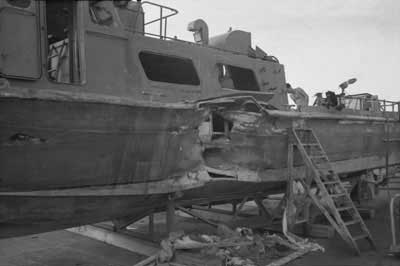 |
Although ours was the first boat in more than a year that had to be left behind, we were lucky. Our escort boat had taken a direct B-40 hit on the fantail where a platoon of Kit Carson Scouts and a SEAL team were sitting. Four men died and more than 30 were wounded. One SEAL team member bled to death in about 30 seconds. They gave me a new boat, but before long we were all transferred out of Sea Float - by now it was being turned over to the South Vietnamese - and sent to Cat Lo, a grubby little river port on the northern edge of the Delta. |
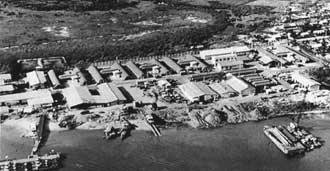 | At Cat Lo my people had nightly shore liberty and got into trouble all the time. One night I got drunk in Vung Tau and posed for a picture with a drugged boa constrictor hanging around my neck. Another night Viet Cong infiltrators exploded a bomb on a bus loaded with U.S. servicemen, killing two of them. Then a couple of Marines in downtown Vung Tau got into a drunken gunfight with some South Vietnamese sailors, wounding five. Cat Lo was really Number Ten. |
We turned our boat over to a Vietnamese crew sometime in October. A couple of weeks after that we turned over the entire division. We had a huge bash and then began thinking about wearing underwear again. It was over. Before Vietnam I was an easygoing optimist who never took anything very seriously, least of all myself. Things simply happened to me, and I greeted life with good cheer. Family and friends knew me as a chatty fellow, very well-adjusted, somewhat absent-minded and irresponsible. The first thing I discovered upon coming home to the "real world" was that I couldn't turn off the switches that Vietnam had turned on. Everything had changed. I no longer trusted anybody. I couldn't make small talk. I couldn't make jokes that weren't incredibly crude or obscene. I became a taciturn loner, no back-slapping, no fun. I was very serious, and very directed. I suddenly knew what I wanted and I was willing to pursue my goals with a single-mindedness that made my family uneasy. The new me was depressing and alarming, because I didn't much like what I had become and because people who had known me for years suddenly didn't know me at all. On the other hand, there was no denying the positive effects Vietnam had on my academic and professional performance. My pumped-up powers of concentration had not deserted me. I scored 200 points higher on the Graduate Record Examinations than I had ever scored on the College Boards. I wrote superb essays. I was spectacular in interviews, expressing myself with cold logic and economy of phrase. Older people - strangers - were tremendously impressed with me. I expected to get anything I wanted, and for the most part I did. This kind of confidence was useful and welcome, for it was the only advantage I had in competing in graduate school with people three and four years younger than I. I couldn't think of anything to do about Vietnam except ignore it. I never got in touch with any of my former crewmen or fellow boat officers. I never deliberately hung out with Vietnam veterans. Vietnam had taught me to cut out anything that was nonessential, and I was still doing it. Now it was Vietnam that was beside the point. So I never talked about it. To anyone. People read all sorts of things into my silence, I suppose primarily that I had been somehow scared by the experience. It is true that I paid a price. In 11 months Vietnam leeched away my youth and high spirits and left me feeling like a stranger to myself and my family. It took years for me to get used to my new skin, but in the end all I really had to do was grow into it. I just got old in a hurry. At 23 I was unable to say this. At 33 I still couldn't. But at 43 I can: I came away from Vietnam with something positive. My gains were personal, but that's the way it is in an expeditionary force in an unpopular war. Winning or losing isn't your problem. Finishing as a whole person with your self-respect intact is what it's all about. I had lived out my comic book fantasies, and survived them - physically and morally. And that is the only thing I did to be ashamed of. |
|
GUY GUGUOTTA was a Miami Herald staff writer when he wrote this article. Permission to use the text has been provided by the Miami Herald � |
This web site is Copyright � 2002 by Robert B. Shirley. All rights reserved. Click on image to return to the homepage
|